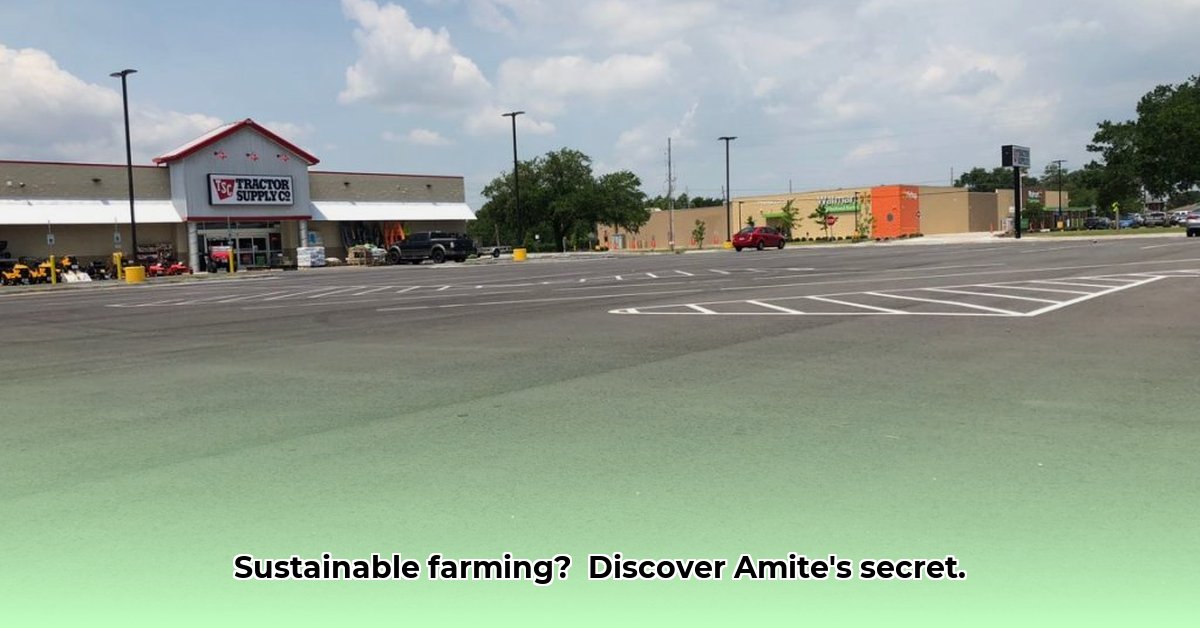
Tractor Supply Amite, a cornerstone of Louisiana's agricultural landscape, occupies a pivotal position in supporting local farmers. Its accessibility offers significant advantages, allowing farmers to readily acquire essential supplies, thus enhancing efficiency and productivity. For similar stores in other areas, see our Natchitoches page. However, the extent to which this convenience translates to sustainable farming practices remains a crucial question. This article assesses Tractor Supply Amite's current contribution to sustainable agriculture, identifying areas needing improvement and offering actionable recommendations for stakeholders.
Accessibility and the Current Situation
Tractor Supply Amite's strategic location undeniably benefits local farmers. The reduced travel time and fuel costs contribute to improved operational efficiency. This convenience, however, doesn't automatically translate into a commitment to sustainable agricultural practices. A critical limitation in our analysis stems from the dearth of publicly available information regarding Tractor Supply Amite's specific sustainability initiatives. This lack of transparency hinders a comprehensive evaluation of its role in promoting environmentally friendly farming. Does the ease of access to supplies directly correlate with the adoption of sustainable methods by local farmers? Further investigation is necessary to answer this question conclusively.
Analysis of Sustainability Efforts (or Lack Thereof)
A significant challenge in assessing Tractor Supply Amite's sustainability efforts is the absence of readily accessible data. There is limited public information regarding their range of eco-friendly products, their supply chain's environmental impact, and any farmer education programs focused on sustainability. This research gap underscores the urgent need for greater transparency from Tractor Supply Amite and the broader corporation. Without readily available information on their sustainability practices, a definitive assessment of their contribution to sustainable agriculture remains elusive. This lack of data necessitates further investigation to fully understand their role in promoting environmentally responsible farming in Louisiana.
Actionable Recommendations
To foster a more sustainable agricultural landscape in Louisiana, a collaborative effort across multiple stakeholders is imperative. The following recommendations outline actionable steps for different entities:
Table 1: Collaborative Steps Towards Sustainable Agriculture in Louisiana
| Stakeholder | Short-Term Goals (Next 12 Months) | Long-Term Vision (3-5 Years) |
|---|---|---|
| Local Farmers | Actively inquire about sustainable products at Tractor Supply Amite; seek out and utilize educational resources on sustainable farming practices. | Implement sustainable farming practices; actively participate in workshops and training sessions; advocate for governmental support of sustainable agriculture. |
| Tractor Supply Amite | Publicly release an inventory of sustainably sourced products; initiate collaborations with local agricultural experts for educational resources. | Expand sustainable product offerings; implement regular training programs for staff on sustainable agriculture; actively promote sustainable farming practices within the community. |
| Tractor Supply (Corporate) | Publish a comprehensive sustainability report detailing their supply chain and sourcing practices; increase transparency on store-specific sustainability efforts. | Invest in research and development of sustainable farming technologies; support local initiatives focusing on sustainable agriculture; establish measurable sustainability goals and publicly report on their progress. |
| Louisiana Government | Provide financial incentives and funding for farmer education programs related to sustainable agriculture. | Develop and implement policies that incentivize sustainable farming practices; invest in infrastructure that supports water conservation and other environmentally beneficial improvements. |
Call to Action
The transition towards sustainable agriculture in Louisiana demands a collective effort. Farmers need readily accessible resources and support, Tractor Supply Amite must prioritize transparency and actively promote sustainable choices, and the Louisiana government must facilitate this transformation through strategic policies and investments. By working collaboratively, we can cultivate a more sustainable future for Louisiana's agricultural sector. We urge readers – farmers, consumers, and Tractor Supply itself – to engage in these recommended actions to foster greater transparency and sustainability within the agricultural supply chain.
Conclusion
Tractor Supply Amite's role in supporting Louisiana's agricultural sector is significant, but unlocking its full potential in fostering sustainable agriculture requires increased transparency and collaborative action. The lack of readily available data about the store's specific sustainability initiatives highlights a critical need for further research and a more proactive approach from all stakeholders. Through increased transparency, collaborative efforts, and strategic investments, we can work towards a more environmentally conscious and sustainable agricultural future for Louisiana.